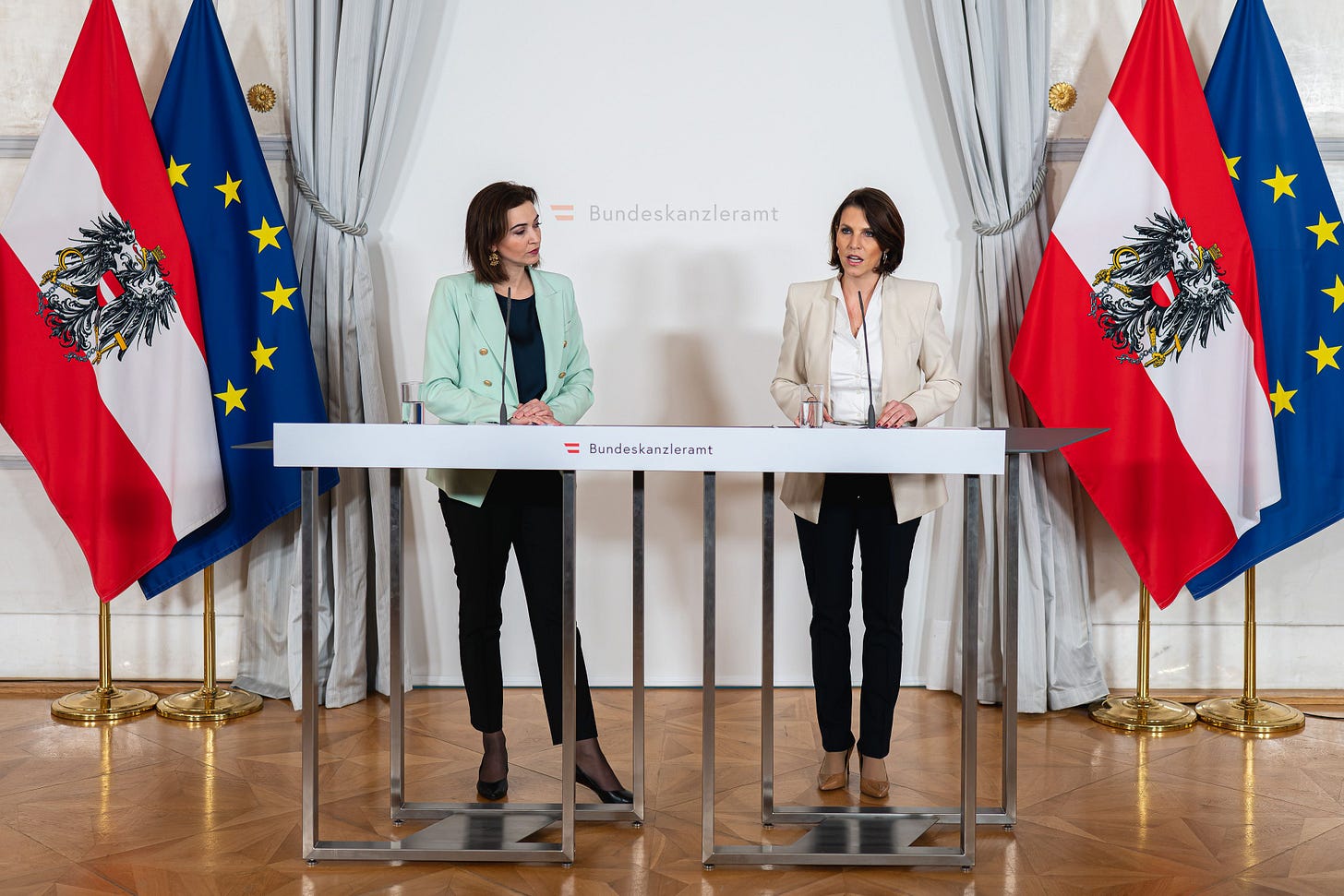(Anti-)Corruption
Austria's coalition partners have agreed terms on a new anti-corruption bill termed the "strongest in the world" by the country's constitutional affairs minister

Servus!
Following months of negotiations, last week the Greens’ justice minister Alma Zadić and the People’s Party’s (ÖVP) minister for constitutional affairs Karoline Edtstadler presented their government’s plans for a new anti-corruption bill. It comes in the wake of the Ibiza affair, during which former vice-chancellor Heinz-Christian Strache (Freedom Party, FPÖ) was caught on tape offering prospective government contracts to a woman he believed was the niece of a Russian oligarch, who had offered to buy an Austrian tabloid and turn it into an organ of far-right support.
The bill would make that sort of behavior—the receipt of political donations in exchange for explicit promises, a form of corruption ex-ante—liable to prosecution even if the politician in question doesn’t follow through on the deal. If enacted, it would also mean:
The buying and selling of political offices—i.e. if a wealthy donor were to offer a political party money in exchange for their desired candidate getting a good slot in the party list—would be outlawed;
Politicians would be automatically barred from holding office if handed down a prison sentence of at least six months for corruption offenses;
A new range of sentences for bribery and corruption offenses up to and including 15 years imprisonment would be introduced;
The scope of anti-corruption law would be broadened to include so-called ‘associations’—party-affiliated non-profits and the like—in which the relatives of politicians are also hold office.
Edtstadler described the bill as the “strongest anti-corruption law in the world,” and indeed, the proposal is certainly a step in the right direction. As the events of the past couple of years have shown—from the Ibiza affair to Sebastian Kurz’s resignation and the fallout from it—Austria has a corruption problem. “Austria has seen an increase in indictments for, and rising costs of, corruption in recent years,” Freedom House concluded in their last Freedom in the World report. “Public-sector corruption is problematic, and the political class is widely perceived as corrupt.”
As Zadić and Edtstadler themselves acknowledged, the anti-corruption bill would need to be the beginning and not the end of Austria’s attempts to root out corruption and introduce a culture of openness and transparency. “Official secrecy remains enshrined in the constitution, and Austria’s overall legal framework on access to information is weak,” Freedom House states. Austria needs a new freedom of information law, though whether the coalition government can finalize that before 2024 remains unclear. Austria also needs stronger party finance legislation—far too easily can parties spend more on campaigning than permitted and get away with it, for one—and stricter regulations when it comes to political lobbying.
Beyond legal reform, the Austrian political system also requires a cultural transformation. The trading of political offices and the ‘re-coloring’ of public sector institutions along party lines are so commonplace in Austria that not only are there words for such things (Postenschacher and Umfärbung) but I’m never entirely sure if most Austrian politicians consider these things to be corruption at all. Far too often, one’s ability to get a high-profile job in or contract from the public sector has nothing to do with qualifications or ability but friendships, connections, and party membership. Worse still, anti-system parties that claim to be opposed to the old way of doing things themselves engage in the politicization of public institutions as soon as they are on the inside (see under: the ORF). Above more conventional forms of corruption, the battle to change the Austrian political system begins here.
Bis bald!
Thank you for subscribing to the Vienna Briefing. If you know someone who might also be interested in receiving this newsletter, consider sharing it with them today.
The Vienna Briefing is a free newsletter. If you enjoy and would like to support my work, think about sending me a tip via PayPal. Thank you to all those who have made donations.
For my readers in New York and the wider tri-state area: On January 25, the Austrian Cultural Forum New York will be hosting a book presentation and panel discussion for Daniel Aschheim’s new book, Kreisky, Israel and Jewish Identity, which looks at specific incidents in and aspects of former chancellor Bruno Kreisky’s political life through the lens of his Jewish identity, including the Arab-Israeli conflict and the rehabilitation of former Nazis in Austria.
Is COVID Over?
Health minister Johannes Rauch plans to allow all COVID-19 laws and countermeasures to lapse after June 30 as part of a ‘return to normality.’ In a separate announcement, the City of Vienna is exploring when to end its mask mandate on public transport. The seven-day incidence rate per 100,000 people nationwide currently stands at 150.5.
So It Begins
Tyrol’s state secretary for security Astrid Mair has broken with ÖVP party leadership to indicate her predisposition to a coalition with the FPÖ at the federal level. Her party, Mair said, should leave “every option and all alternatives” on the table going into parliamentary elections in 2024.
Parliament Reopens
Austria’s federal parliament building on Vienna’s Ringstrasse was formally reopened last week following years of extensive renovations. German president Wolfgang Schäuble’s inaugural speech was criticized by Green party politicians for its politicized nature including its indirect criticism of contemporary gender politics.



